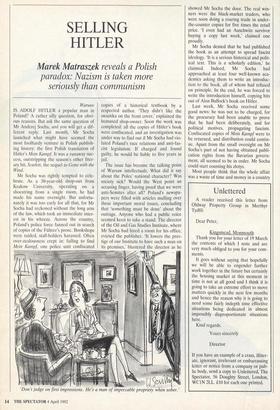SELLING HITLER
Marek Matraszek reveals a Polish
paradox: Nazism is taken more seriously than communism
Warsaw IS ADOLF HITLER a popular man in Poland? A rather silly question, for obvi- ous reasons. But ask the same question of Mr Andrzej Socha, and you will get a dif- ferent reply. Last month, Mr Socha launched what might have seemed the most foolhardy venture in Polish publish- ing history: the first Polish translation of Hitler's Mein Kampf. It was a runaway suc- cess, outstripping the season's other liter- ary hit, Scar/ett, the sequel to Gone with the Wind.
Mr Socha was rightly tempted to cele- brate. As a 30-year-old drop-out from Krakow University, operating on a shoestring from a single room, he had made his name overnight. But unfortu- nately it was too early for all that, for Mr Socha had reckoned without the long arm of the law, which took an immediate inter- est in his wheeze. Across the country, Poland's police force fanned out in search of copies of the Fiihrer's prose. Bookshops were raided, stall-holders harassed. Often over-zealousness crept in: failing to find Mein Kampf, one police unit confiscated
copies of a historical textbook by a respected author. 'They didn't like the swastika on the front cover,' explained the bemused shop-owner. Soon the work was completed: all the copies of Hitler's book were confiscated, and an investigation was under way to find out if Mr Socha had vio- lated Poland's race relations and anti-fas- cist legislation. If charged and found guilty, he would be liable to five years in jail.
The issue has become the talking point of Warsaw intellectuals. What did it say about the Poles' national character? Was society sick? Would the West point an accusing finger, having proof that we were anti-Semites after all? Poland's newspa- pers were filled with articles mulling over these important moral issues, concluding that 'something must be done' about the outrage. Anyone who had a public voice seemed keen to take a stand. The director of the Oil and Gas Studies Institute, where Mr Socha had hired a room for his office, evicted the publisher. 'It lowers the pres- tige of our Institute to have such a man on its premises,' blustered the director as he
'Don't judge on first impressions. He's a man of impeccable propriety when sober.' showed Mr Socha the door. The real win- ners were the black-market traders, who were soon doing a roaring trade in under- the-counter copies for five times the retail price. 'I even had an Auschwitz survivor. buying a copy last week,' claimed one proudly.
Mr Socha denied that he had published the book as an attempt to spread fascist ideology. 'It is a serious historical and polit- ical text. This is a scholarly edition,' he claimed. Indeed, Mr Socha had approached at least four well-known aca- demics asking them to write an introduc- tion to the book, all of whom had refused on principle. In the end, he was forced to write the introduction himself, copying bits out of Alan Bullock's book on Hitler.
Last week, Mr Socha received some good news: he was not to be charged, for the procuracy had been unable to prove that he had been deliberately, and for political motives, propagating fascism. Confiscated copies of Mein Kampf were to be returned, and distribution could contin- ue. Apart from the small oversight on Mr Socha's part of not having obtained publi- cation rights from the Bavarian govern- ment, all seemed to be in order. Mr Socha could start counting his zlotys.
Most people think that the whole affair was a waste of time and money in a country that has more important things to worry about than a reprint of Hitler's Mein Kampf, and that it was all more of a farce than a scandal. It was not the ordinary Pole who took offence at Mr Socha's entrepreneurship. Readers bought the book in droves, although now that the sen- sation has died down, so will sales. It was the intellectual and the bureaucrat who took umbrage at the spontaneous response of the masses. This was quite predictable, since both are products of a system that sought to control people's lives, and it was they who did the communist state's work for it. When tens of thousands of Poles decided they wanted to read the rantings of a man who had destroyed their country 50 years ago, it was a slap in the face for those who had made their careers under the communists by trumpeting the evils of fascism. Here was evidence that their engi- neering had failed, and that national iden- tity is more sophisticated than that symbolised in the organised pomposity of parades and patriotic speeches.
It was also natural that the resultant frenzied anger should be channelled through the police and courts, for whom harassment of independent publishers is a well-practised art. The clauses used against Mr Socha were the tried and tested ones of 'spreading racial hatred' and 'fascist ide- ology', derived from the Stalinist legal codes of the Fifties used to eliminate anti- communists from public life. Now Mr Socha may or may not be anti-communist — I rather suspect he doesn't particularly care one way or the other. His particular thoughtcrime had been to challenge the dignity of national myth and intellectual sensibilities; that was enough to engage the bureaucratic machinery of repression.
This absurd rumpus has been about an ideology that no one takes seriously any more. Yet those who were ready to put Mr Socha away for a few years are living in a country where in every city there are com- munist criminals freely walking the streets who still believe they were right to do what they did. The Polish quisling, General Jaruzelski, who was a faithful servant of Soviet interests for 50 years, and who turned his tanks on his own people ten years ago, is about to publish his memoirs in which he will justify himself — and the ideology of class hatred — to the Polish people.
It is doubtful whether our procuracy and police force will be quite as concerned about tracking down the thoughts of the General — increasingly being spoken of as a Polish patriot — as they were those of the Fiihrer, although it is likely that Gen- eral Jaruzelski will have the privilege of having his book outstrip even Hitler's in terms of sales. That will raise no eyebrows among Polish intellectuals. After all, who would ever take communism seriously?
Marek Matraszek is the Warsaw director of the Jagiellonian Foundation



























































 Previous page
Previous page